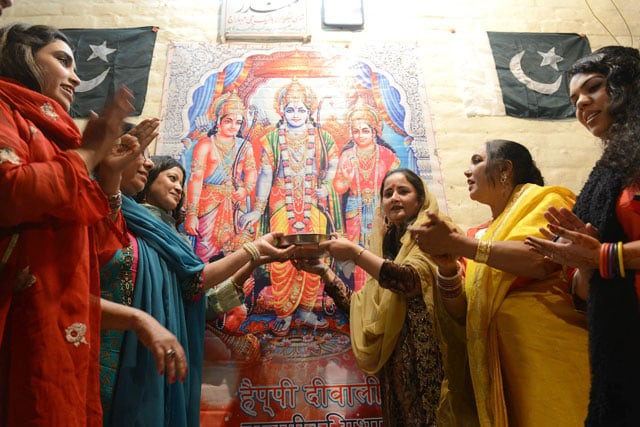Laws and loopholes: No rules of business put fate of Hindu women in jeopardy
Even after SC passed the Hindu Marriage Act 2017, only Sindh managed to produce the rules of business for women

PHOTO: EXPRESS
“I gave birth to my son at my parents’ home but my ex-husband was neither ready to provide child support nor my dower rights,” lamented Kumari as tears streamed down her face. “I’ve been stuck in a legal limbo; fighting for me and my son’s rights but there’s no avail in sight,” she added.
Kumari’s story, although distressing, resonates with hundreds of Hindu women in Pakistan, who’ve been left without their dower rights in the absence rules of business for the act. Some three years ago, the National Assembly on directives of the Supreme Court of Pakistan, had passed the landmark Hindu Marriage Act 2017. However, with no proper framework in place to enforce the law, out of the four provinces, only Sindh had managed to produce the rules of business, leaving the local Hindu community distressed in the wake of surging divorce rates.
Indian Hindu temple board reverses opposition to entry of women
“In March of 2017, the Parliament passed the Hindu Marriage Act 2017 and directed that every province will make their rules of business but due to the lack of interest of the K-P government even after 30 months of the law the provincial government has been unable to produce Rules of Business for the Hindu Marriage Act 2017,” said Haroon Sarabdyal, a social activist working for the rights of the Hindu community in Peshawar.
According to Sarabdyal, at the time of Kumari’s case, the family court of Peshawar had been sitting over 18 applications from Hindu women seeking dower rights from their ex-husbands. However, given the inconsistency of the rules across all provinces, these women have little to be hopeful about as far as their cases are concerned.
Sarabdyal further highlighted that according to Section 7 of the Hindu Marriage Act 2017, the marriage registrar is also required to make three copies of the Shaadiparat; one for the bride, one for the bridegroom and the third for the marriage registrar to keep as a record. The peculiarity of such a section may appear as women having the right to distinctively protect their marriage and keep a proof of it, but unfortunately due to the lack of rules of business, the official procedures are seldom followed; leaving women on the short end of the stick during divorce cases.
Earlier, the K-P government had sent a draft for the rules of business to the Auqaf, Hajj, Religious and Minority Affairs Department but there was confusion about how to address the situation and the draft was eventually forwarded to the Local Government Department. However, Sarabdyal revealed that unfortunately there is no expert present in the government department to draft the rules of business for the Hindu marriage act which has been one of the reasons for the delay. “In the absence of rules of business, a man is free to divorce his wife and refuse her dower right. This puts the fate of over 0.2 million Hindu women in jeopardy and no women in our community can feel safe about their marriage until the rules of the business are produced,” he added.
According to Advocate Peshawar High Court, Shaukat Ghulam, he’s been witness to many such family dispute cases where Hindu men have gotten away with refusing dower rights due to the loopholes in the legal system. “We will soon submit a writ application in the Peshawar High Court and demand the government to make the rules of business for the minority community to keep such cases from repeating themselves,” he stated.
Indian women seek police protection after entering Hindu temple
A section officer at the Local Government Department on condition of anonymity revealed that they’ve worked out the rules of business for the Hindu Marriage Act 2017 with the help of a Hindu religious leader. “The draft has been sent to the Law Department, which will be forwarding it to the cabinet in a week’s time and it will soon be presented in the assembly.”
Ravi Kumar a member of the K-P Provincial Assembly while talking to the Express Tribune said that as a Hindu, he was also involved in the making of the rules of business for the Hindu Marriage Act 2017. According to Kumar, they’ve used the Sindh Marriage Act as a reference for the rules of business and it will soon be implemented in K-P.
“Although the rules of business has been sent to the law department, when it comes to the cabinet we will review it once again ensure that it is in accordance with the Hindu religion and the community should rest assured that no rules in conflict with the religion will be allowed to pass,” the provincial assembly member told The Express Tribune.
Published in The Express Tribune, December 22nd, 2019.













COMMENTS
Comments are moderated and generally will be posted if they are on-topic and not abusive.
For more information, please see our Comments FAQ